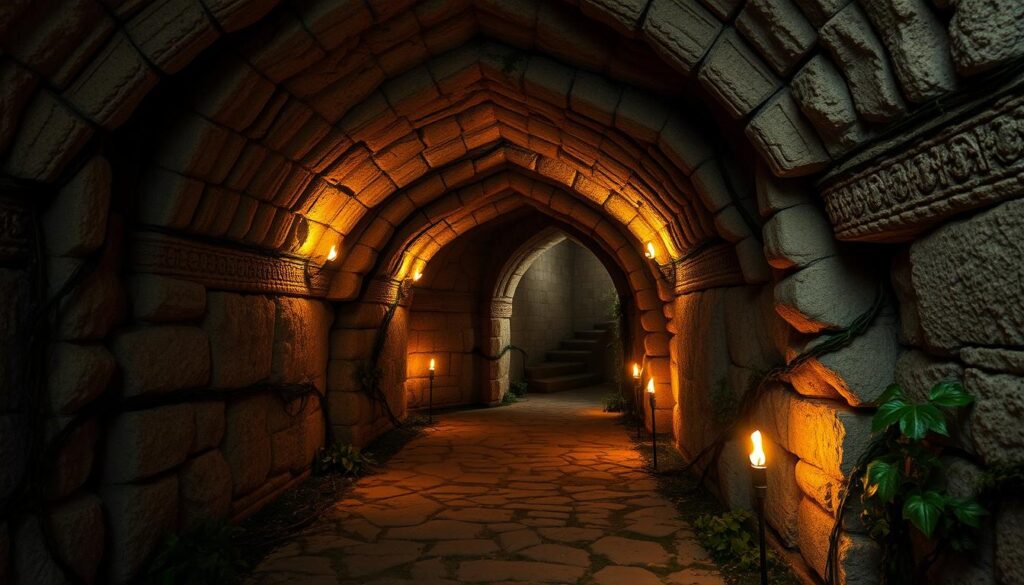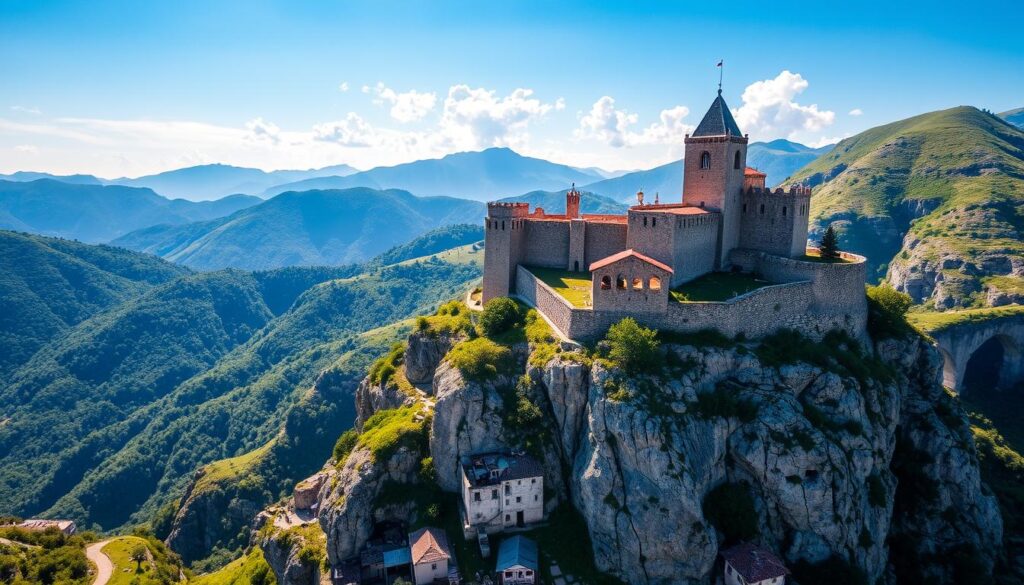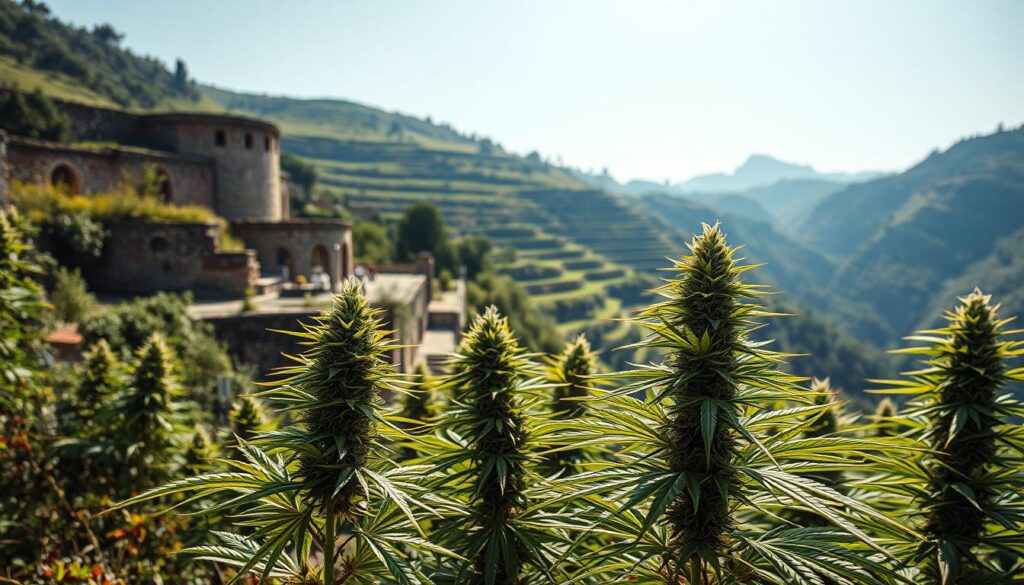Welcome to Gjirokaster, a historic city in Albania. It’s known for its cannabis cultivation. This city shows the illegal drug trade in the Balkans. We’ll look at the local weed scene and the region’s marijuana farming tradition.
Gjirokaster is not just any tourist spot. It has a hidden cannabis economy. The city’s growing conditions and mafia control make it special. You’ll see cannabis fields and weed deals on the streets.
In Gjirokaster, the rules about drugs are not clear. The government’s drug programs meet the city’s long marijuana tradition. Whether you’re new or know a lot about cannabis, Gjirokaster has a story to share.
Key Takeaways
- Gjirokaster is known as the “cannabis capital of Albania” due to its thriving underground marijuana industry.
- The region’s ideal growing conditions and the mafia’s control over the narcotics trafficking in the Balkans have contributed to the prevalence of cannabis cultivation in Gjirokaster.
- The city’s role in the drug eradication programs of the Albanian government and the long-standing tradition of hemp production in the region create a complex and fascinating dynamic.
- Gjirokaster offers a unique opportunity to explore the intersection of illegal drug trade and cultural heritage in the Balkans.
The Mysterious Stone City of weed in Gjirokaster
Perched atop Mount Sopot, Gjirokaster in southern Albania is amazing. It’s like a “prehistoric creature clawing its way up the mountainside.” This Gjirokaster architecture is unlike any other. Houses and buildings seem carved into the steep slopes.
The historic buildings, like the 18th-century bazaar mosque, show the city’s rich culture. This culture has shaped Gjirokaster over the years.
The City of Stone
Gjirokaster is called the “City of Stone.” It has a magical feel with its cobbled streets and slate roofs. The architecture, carved into the mountains, offers a unique experience.
It feels like stepping back in time when you visit.
weed in Gjirokaster Bazaar
The Gjirokaster bazaar is the city’s heart. It’s full of life and color. You’ll smell mountain herbs and see vibrant crafts and costumes.
There’s intricate woodwork and stonework. You can find souvenirs and memorabilia. The bazaar is a key spot for Gjirokaster tourism.
“Gjirokaster defies traditional city planning, with houses and buildings seemingly carved into the mountainside.”
Exploring the Rich Tradition of Cannabis Cultivation
Gjirokaster is known as the “City of Stone.” It’s famous for its Gjirokaster traditional costumes. The Gjirokaster artisans spend months on each costume, adding up to 80 details.
These costumes are made with gold. They impressed Lord Byron so much. He loved their beauty. The city is also known for its wood and stone work.
“The Gjirokastran costumes are truly a sight to behold, with their intricate designs and dazzling golden threads. It’s no wonder they have captured the admiration of so many, including the legendary Lord Byron himself.”weed in Gjirokaster
The art in Gjirokaster shows the city’s spirit and creativity. Visitors can see the beauty of Gjirokaster’s crafts. It’s a special cultural tradition.
weed in Gjirokaster: A Booming Underground Industry
Under Gjirokaster’s cobblestone streets, a secret world exists. Tunnels and bunkers from the Cold War now house Albania’s cannabis farms. The Gjirokaster tunnel was once a secret shelter for officials. Now, it’s a key part of the cannabis industry.
Pyramid Schemes and Albanian Civil War (1997)
After communism fell, Albania faced big changes. Pyramid schemes, promising high returns, became popular. But when they failed, the country fell into chaos.
The 1997 civil war was a time of looting and violence. Gjirokaster was hit hard. This chaos helped the illegal drug trade grow, including cannabis.
The story of the Gjirokaster tunnel shows Albania’s complex history. The Cold War, pyramid schemes, and civil war led to a booming cannabis industry.

Uncovering the History of Gjirokaster Castle
The Gjirokaster Castle stands tall over the city of Gjirokaster. It has been a watchful structure since the 12th century. The castle’s look today comes from the 18th century, thanks to Ali Pasha of Ioannina.
Ali Pasha was a powerful Albanian Ottoman ruler. He went from being a bandit to a Pasha. His story shows the complex and changing Albanian history.
Who was Ali Pasha of Ioannina?
Ali Pasha was born in 1740. He was smart and built alliances to rise in the Ottoman Empire. He started as a bandit but became a Pasha, ruling a big area.
His time in power was both brilliant and harsh. He had to deal with many political challenges.
Lockheed T-33 Shooting Star
Inside Gjirokaster Castle, you can find interesting pieces from Albania’s past. There’s a Lockheed T-33 Shooting Star, captured in 1957. It reminds us of the castle’s importance during Cold War times.
The castle also has an Italian Fiat L6/40 tank. It was the only tank to climb Gjirokaster’s steep streets during the war. These finds show how the city was a key military spot in Albanian history.

“The Castle of Gjirokaster houses a military museum and other points of interest, including a tekke from the Bektashism sect and remains of a US airplane captured during the Cold War.”
Conclusion weed in Gjirokaster
Gjirokaster, known as the “City of Stone,” is more than just a place for growing cannabis. It has a rich history, beautiful landscapes, and a fascinating past. This city in southern Albania is full of culture and natural beauty.
The city’s cannabis industry is part of its story. But Gjirokaster is also famous for its Ottoman-era buildings, crafts, and historical sites. Places like Gjirokaster Castle and the Gjirokaster Bazaar show the city’s diverse side.
Visiting Gjirokaster lets you see Albania’s complex ties to cannabis. You can learn about the city’s efforts to welcome tourists. Gjirokaster is a place where history, culture, and nature come together. It’s a unique experience that shows the true beauty of this Albanian city.



I Was looking for weed and i came across Zeus weed recommended by a friend . Zeus is super friendly, making it easy to get cannabis products. The delivery service is reliable with professional riders ensuring timely arrivals.
The quality of their products is top-notch, and their customer service is attentive and knowledgeable, offering helpful recommendations. Highly recommended for anyone seeking convenience, quality, and professionalism.
Add his Zangi private number for confidential correspondence text.
Zangi private Number : 1047789965
Click link for zangi : https://services.zangi.com/dl/conversation/1047789965
Contact him email : weedzeus35@gmail.com
Note:
He accept only btc/usdt and do not take cash payment.
Thanks bro, we ordered from him for the first time and couldn’t have been happier. They were willing to drive all the way out to my hotel as fast as possible . They were very helpful when we had a bunch of questions on the strains. We used both the Zangi app and text them directly . Prices are extremely reasonable – cheaper than where we were ordering from for years. They also have the strongest cannabis we’ve seen being sold – which my wife needs for medical reasons.
Will definitely be ordering from Zeus weed again.
Excellent Customer Service!!
It’s so great to speak with nice humans that care about their customers. Every order I’ve made has been 100%.
I will absolutely continue to purchase from Zeus Weed.
Zeus Weed is what made my experience great! He was kind to me and patient and answered all my questions. I loved everything about the experience. Highly recommend!
email them.. weedzeus35@gmail.com
Ordering was effortless. The delivery time was faster than expected, and the delivery guy called me to coordinate the pick up spot and was very respectful. The only problem is that i have to send bitcoin which i am not not use to it .